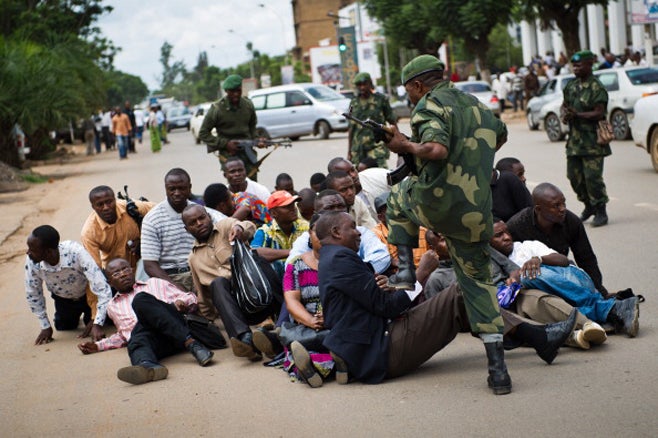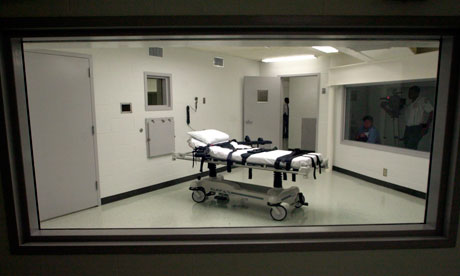Vol. 6, Issue 19 – December 19, 2011
INTERNATIONAL CRIMINAL COURT
Central African Republic & Uganda
- BembaTrial.org: Expert Tells Court Bemba was Supreme Commander and Had Direct Control Over His Troops
- BembaTrial.org: Prosecutors Barred From Questioning Expert About Testimony of Insider Witness
- BembaTrial.org: Bemba Defense Claims Witness Statements Contradict Expert’s Report
- BembaTrial.org: Defense Insists Patassé Commanded Bemba’s Troops
- BembaTrial.org: Military Expert Says Bemba Bore Command Responsibility but Defense Faults His Testimony
Darfur, Sudan
- ICC Press Release: ICC Prosecutor Presents New Case in Darfur
- Time World: George Clooney’s Satellites Build a Case Against an Alleged War Criminal
- Washington Post: ICC Prosecutor: Sudanese President’s `Destiny’ is to Face Justice for Alleged War Crimes
- Reuters Africa: Wanted Men Still Committing Crimes in Darfur – ICC
Democratic Republic of the Congo
Kenya
- AllAfrica.com: Robust Witness Protection Unit Key to PEV Cases
- The Standard: Kenyans’ date with Ocampo, Bensouda
- The International Criminal Court Kenya Monitor: HRW: Kenya Needs Independent Tribunal to Handle Poll Violence Cases
Libya
- Reuters: Mexico Says Foiled Plan To Smuggle In Gaddafi Son
- CNN: Gadhafi’s Daughter Pushes for Death Probe
- The Press Association: Gaddafi Death ‘May Be War Crime’
Cote d’Ivoire (Ivory Coast)
- Aljazeera: Ivory Coast’s Gbagbo Faces War Crimes Court
- Institute for War and Peace Reporting (IWPR): Ivory Coast: Calls for More Prosecutions
AFRICA
International Criminal Tribunal for Rwanda
- Hirondelle News Agency: Security Council Challenged to Find Host Countries for ICTR Acquitted Persons
- Hirondelle News Agency: Prosecution Requests Life Imprisonment for Captain Nizeyimana
- Hirondelle News Agency: ICTR Prosecutor Wants Kenya, Zimbabwe to Act Over Kabuga and Mpiranya
- Hirondelle News Agency: ICTR Appeals Chamber to Decide Fate of Bagosara Wednesday
- Hirondelle News Agency: Prosecution Gives up Appeal in Four Ex-Rwandan Ministers� Case
- Hirondelle News Agency: Prosecution Seeks Enhancement of Sentence Against Kanyarukiga
- Hirondelle News Agency: Defence Requests Appeals Chamber to Acquit Lieutenant Hategekimana
Special Court for Sierra Leone
EUROPE
Court of Bosnia & Herzegovina, War Crimes Chamber
- The Court of Bosnia and Herzegovina: Closing Arguments of Defense in the Srpko Pustivuk Case
- The Court of Bosnia and Herzegovina: Indictment Confirmed in Muhidin Basic and Another Case
- The Court of Bosnia and Herzegovina: Plea Hearing in the Oliver Krsmanovic Case
- The Court of Bosnia and Herzegovina: Commencement of Trial in the Veselko Raguz and Another Case
- The Court of Bosnia and Herzegovina: Status Conference and Commencement of Main Trial in the Fikret Planincic et al. Case
- The Court of Bosnia and Herzegovina: Oliver Krsmanovic Enters a Not Guilty Plea
International Criminal Tribunal for the Former Yugoslavia
- Institute for War & Peace Reporting: Tolimir Defence Case Date Set
- Institute for War & Peace Reporting: ICTY Still Aiming for December 2014 End Date
- Institute for War & Peace Reporting: Former Officer Convicted of Contempt
- Institute for War & Peace Reporting: Witness Insists Stanisic Not Part of VRS Command
- Institute for War & Peace Reporting: Karadzic Challenges Pathologist on Remains at Srebrenica
Domestic Prosecutions In The Former Yugoslavia
- Ahram Online: Three Men Indicted for War Crimes Against Serbs in Sarajevo
- Focus News Agency: Bosnia Arrests Three Muslims Over War Crimes
MIDDLE EAST AND ASIA
Extraordinary Chambers in the Courts of Cambodia
- VOA Khmer: Khmer Rouge Leaders� Evidential Hearing Starts in Phnom Penh
- VOA Khmer: Former Cadre Sees Rise of Khmer Rouge Under �Aggression�
- Phnom Penh Post: KRT Defence Motions Denied
- Phnom Penh Post: KR Tribunal: Questions Over Witness �Deaths�
- VOA Khmer: Ieng Thirith Will Not Yet be Released: Tribunal
- VOA Khmer: Nuon Chea Says Evacuation was Planned to Protect Population
- Phnom Penh Post: Ieng Thirith Hospital-Bound
Special Tribunal for Lebanon
- The Daily Star: STL Not Investigating False Witnesses, Says Tribunal�s Registrar on Twitter
- Special Tribunal for Lebanon: Prosecutor Bellemare Decides Not to Seek Reappointment for a Second Term
- Special Tribunal for Lebanon: Media Advisory: Reaction to the Announcement of the STL Prosecutor
- Special Tribunal for Lebanon: Media Advisory: Victims Participation Unit Holds Training Seminar for Counsel
Bangladesh International Crimes Tribunal
- Bangladesh News 24: S Q Chy�s Proceedings Plea Rejected
- The Daily Star: Freedom Fighter Narrates Mar 25 Sayadee Role
- Bangladesh News 24: “There he is, Sitting at the Back…”
- Bangladesh News 24: Proceedings Against Sayadee Adjourned Until Sunday
- Gulf Times: Radio Bangladesh Tapes of 1971 War Missing, Destroyed
- Bangladesh News 24: Resist Conspiracy Over War Crimes Trials
- Bangladesh News 24: Sayedee Defence Questioning Witness
- Zee News: War Crimes Charged Against JI Leader Azam
- Bangladesh News 24: ICT Appoints Lawyer for SQ Chy
- Bangladesh News 24: Defence to Grill 1st Witness Again Thursday
NORTH AND SOUTH AMERICA
United States
- Agence France Presse: Nazi Hunters Launch New Drive to Prosecute War Criminals
- Washington Post: Influence Industry: Sudan Hires its First U.S. Lawyer in Years, Prompting Protests
- New York Times: Obama Drops Veto Threat Over Military Authorization Bill After Revisions
- CNN: Accused Wiki-Leaker Faces Judgment Friday
- CNN: Civil Liberties Group Calls for Privacy Protections Involving Domestic Drones
TOPICS
Terrorism
- The National Post: Men Arrested Under Security Certificates Shocked by CSIS Torture Allegations
- Today’s Zaman: Turkish Court Arrests 16 Suspects in KCK Investigation
- The Washington Post: Canadian Troops in Afghanistan to Hand over Afghan Prisoners to US Authorities
- Deutsche Welle: German Police Arrest Alleged Al-Qaeda Cell Member
- CNN: Yemenis Capture Six Al-Qaeda Operatives
Piracy
Gender-Based Violence
- VOA Khmer: Victims of Khmer Rouge Sex Crimes Want Voice in Court
- The Associated Press: Next International Criminal Court Prosecutor Pledges To Prosecute Sexual and Gender Crimes
- The UN News Centre: UN Officials Urge Eradication of Sexual Violence in Africa’s Great Lakes Region
REPORTS
UN Reports
NGO Reports
- International Solidarity Movement: Khan Al-Ahmar: Forced Expulsion of Bedouins from Area C
- Amnesty International: Panama: Fresh Investigations Urged After Manuel Noriega Extradition
- Human Rights Watch: Syria: Shoot to Kill Commanders Named
TRUTH AND RECONCILIATION COMMISSIONS
Canada
Kenya
- The Nation: Maasai Urge State to Return Nairobi Ancestral Land
- The Standard: Children Tell Truth Body How They Were Raped and Burnt
Nepal
Thailand
COMMENTARY AND PERSPECTIVES
- Jurist: Political Interference and Judicial Misconduct Impede Justice in Cambodia
- Opinio Juris: A Response to Christian De Vos by Gideon Boas
- American Society of International Law Insights: Epilogue to Hotel Rwanda
- All Africa: Rwanda: 2012 Will Be Critical for Justice, Genocide Fugitive Trackers Say
- Radio Netherlands Worldwide: Cambodia: Paying Justice No Mind
- Spiegel Online International: The ICC�s Disappointing Track Record
- The Times of India: Gaddafi�s Daughter Demands ICC Probe into Father�s Death
WORTH READING
- International Law Studies: Status of Government Forces in Non-International Armed Conflict
- Ohio Northern University Law Review: Criminalized State: The International Criminal Court, the Responsibility to Protect, and Darfur, Republic of Sudan
—
War Crimes Prosecution Watch is a bi-weekly e-newsletter that compiles official documents and articles from major news sources detailing and analyzing salient issues pertaining to the investigation and prosecution of war crimes throughout the world. For more information about War Crimes Prosecution Watch, please contact warcrimeswatch@pilpg.org.



